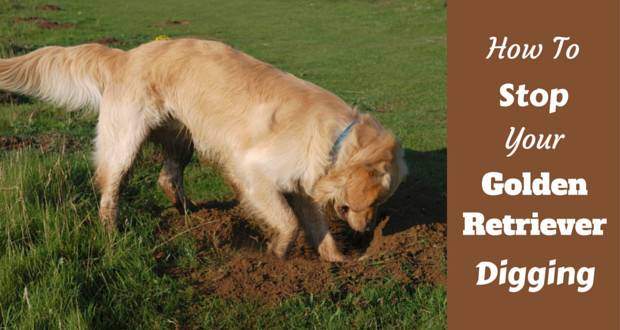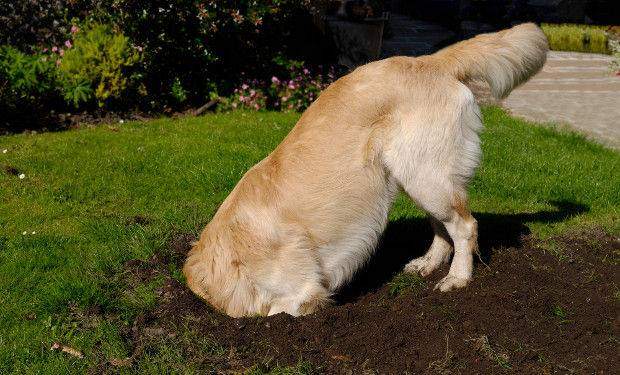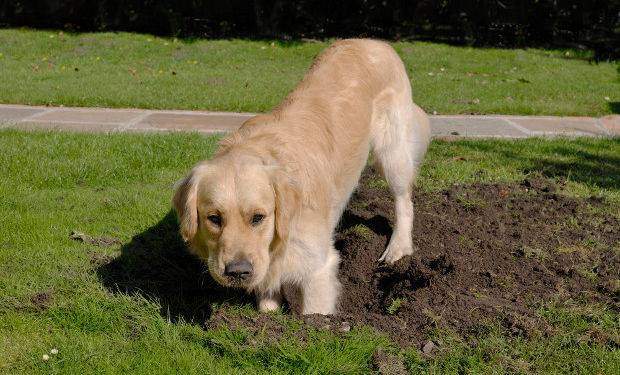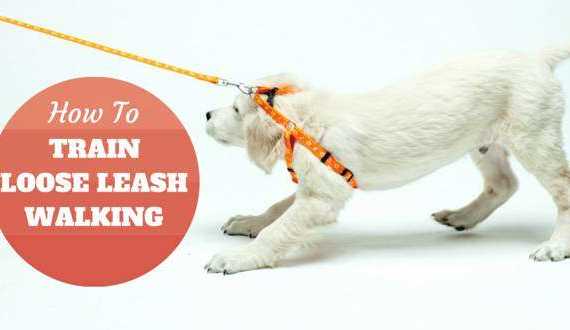Updated: August 10th, 2022

Photo Credit: © Depositphotos.com / clickos
Although digging is a very normal behavior for dogs, it doesn’t stop that sinking feeling when you head outside and see the mess your dog has made of your previously beautiful outside space.
Whether you have a small yard, or a large stretching garden, dogs will still love a good dig if they’re given half a chance!
But rather than give up and pave over every lawn space around you, there is a range of things you can do to stop your Golden Retriever from making a mess of your much-loved garden.
Digging Never Used to Be an Issue!
Lots of puppies love to investigate every new inch that is presented to them, and for most dogs, this is where the fascination with digging will start. While smaller puppies will gently nudge plants and scratch under fences, as they get bigger…so will the level of destruction! You’ll soon find yourself dealing with up-rooted plants and holes big enough to fall over.
While digging is a natural habit for dogs, the fact is it’s not a good idea to let them do it – for both aesthetic and safety reasons, so take a look at the rest of the article for ideas on how to understand and solve the issue.
Why Does My Dog Dig?
There are lots of reasons why dogs dig, and thinking about why they might be doing it is a big step towards getting them to stop. Here are a few of the more common reasons Golden Retrievers dig:
- Instinct: Golden Retrievers were originally bred to help their owners during gaming season by retrieving small animals for them. In some cases, this breed has been known to dig near the nests of small animals like mice and voles, even if they haven’t been trained to do it on command by their owner.
- Anxiety: digging can be a great stress relief for dogs, so if something has changed in their routine or household, this can lead to the development of this behavior, even if it wasn’t a big issue before. If your dog senses new neighbors, they may also dig near fences to release stress and assert their territory with the new people and animals.
- Boredom: Golden Retrievers need lots of exercise and are a very active breed. If you don’t take them out every day for a fairly long walk, and keep them amused at home, they may decide to dig to help get rid of all that excess energy they have building up.
- Heat: Because of the Golden Retrievers’ coat, hot days can make them feel very hot and uncomfortable. A few inches below soil level can be a good couple of degrees cooler than on the surface, so if your dog is trying to dig a hole roughly the length of their body, they may be trying to cool down.
- Too much food: If you’re giving your dog too much food, they may try and hide some in holes in the garden, so they have somewhere to go back to if you’re away or forget to feed them. This is instinctive behavior, so you may need to adjust the amount of food you feed your dog if they start up with this habit.
If you can work out why your dog is digging, it can be much easier to stop them from doing it, but don’t worry – no matter what the cause, there are methods you can try to help them break this nasty habit.
Basic Methods to Try

Photo Credit: © Depositphotos.com / clickos
If you have worked out what is causing your dog to dig, then your problem could be fairly easy to solve, but for some owners, it can take a bit more time and effort to stop this destructive instinct.
Here are a couple of very basic training ideas to help you if your dog isn’t showing obvious clues as to why it is digging:
Keep Them Company Outside
Making sure you’re outside at the same time as your dog, means you’ll be there to re-inforce good behavior. You could play with them in the garden, and give them toys that they may instinctively try to bury, but teach them it is bad to dig, and praise them if they play with the toy in a more acceptable way.
Give Them Their Own Area
If you can avoid it, try not to leave a digging dog outside when you’re not at home to watch them, but if they need to be outside on their own, you might want to consider giving up an area of the garden where they are allowed to dig.
Create an area in your garden that you don’t mind being destroyed…you could make an area filled with loose soil, or even play sand for them to dig in and bury their toys. You will need to train them to only dig in the area you have set up, but it will allow them to indulge their instincts safely if you chose to go down this route.
Training Methods
There are a few well-established methods that have worked well for numerous owners with a digging dog. An in-depth exploration of each method could easily become a whole article on each one, but we’ve created a basic explanation of each one to help you decide if any of the methods might be useful for you.
Counter-Conditioning
The idea behind this training method is to teach your dog to associate negative situations (like being left alone if you go to work) with something very positive, like a treat or a favorite toy.
This method can be a great help if your dog is digging because they are anxious, as over time, they can become less stressed by key events as they learn to associate them with the new positive actions.
Positive Reinforcement
This is one of the most common methods of training puppies and dogs, and can work really well when trying to stop unwanted behaviors. This method relies on you being around in the garden for a while, to quickly give praise and treats if your dog behaves in the way you want them to.
If your Golden Retriever is burying items in the garden, try giving them a toy they are likely to bury, and then tell them to sit or stay. If they resist the urge to run off and bury their new found treasure, then reward them.
Once your dog starts to understand what is wanted of them, only give them a treat every other time you give them something and they don’t dig to bury it…and keep dropping the frequency of the treats until they fully understand how they should behave in the garden.
Restriction
If you haven’t trained your dog on how to behave outdoors when they are unsupervised, you may want to consider restricting their access. Lots of owners choose to crate train their dogs, and this means you can leave your dogs in their crate, where they will be calm and safe until you can get back to supervise them.
It’s important to crate train your dog properly if you want to use this method, to ensure your Golden Retriever is happy and comfortable in their crate while you aren’t there.
Supervision
Whenever you can make the time, sitting outside with your dog is a great way to stop digging becoming an issue. Head out to the garden with them, and watch what they do…the second you see any signs of them getting ready to dig, call them over to you.
If they respond well and come running, now is the time to praise and treat them. It doesn’t matter how you reward them – a treat, a few minutes playing ball, or just lots of praise may work well, but you can try anything your dog loves and will respond well to.
If they manage to dig a hole without you noticing, don’t feel you need to punish them…just ignore your Golden Retriever while you calmly fill in the hole they have created, and take your dog back inside until you feel you are ready to take them out for more training.
How to Stop Your Golden Retriever Digging: A Step-by-Step Guide

Photo Credit: © Depositphotos.com / clickos
To make solving your dog’s digging issues as simple as possible, try our easy to follow guide to help keep you on track:
- Consider why your dog is digging, and rule out any easy-to-solve issues like needing more exercise or less or better food.
- Spend time with your dog outside to observe them.
- Sit with your dog near places they frequently like to dig – if you see them circling, sniffing or starting to whine, then move to step 4.
- At the first sign of any digging, call your dog to you, and reward them if they come. If you’re creating an area where they are allowed to dig (like a sand box), now is a good time to take them over to it and hide their toys. If your dog digs in this area, remember to praise and reward them for digging in the correct place.
- If your dog manages to dig a hole, stay calm, fill it, and end the time outside until you feel ready for the next training session.
Training Takes Time
If your dog is a big fan of digging, then don’t expect their behavior to suddenly change after a couple of days of training. Changing a dog’s behavior takes time, so don’t feel disheartened if you catch your dog digging even after you have been trying to train them for a while.
The most important thing to remember with any type of training, is that you need to stay calm, and keep positive. You won’t fix your dog’s digging problems by shouting at them or punishing them…just like people, dogs respond much better to being rewarded for a job well done!
Sometimes, dogs can have very complex reasons for digging that may not be as easy or simple to solve. If you ‘ve tried the methods suggested here, and you don’t seem to be making any progress, then don’t be afraid to seek support from a professional… they may read signs in your dog’s behavior in a different way to you, and that could be all you need to start making progress.
Conclusion
Digging is a very common problem, so don’t panic! Start by considering why your dog might be digging, and from that point you can work out which training methods might suit you and your situation.
Remember that you are in control – dogs can change their behavior if they’re properly trained. Just stay calm, and make sure you’re giving your dog clear instructions on how to behave when they’re in your outside space, and yes, it is YOUR space! Your dog simply needs to learn the boundaries you want to put in place.
So get ready to put in the extra effort, give it time, and you’ll have a great looking garden that you can share with your well trained Golden Retriever before you know it!




3 Comments
Joanne
Thank you for your insight.
Great information.
Appreciate your suggestions!
Matt
A really enjoyable read,
I have 2 dogs a standard poodle and a new golden retriever so I noticed it starting to think about digging whereas I didn’t have this issue with the other.
Thank you for spending time to write your experience with this, this helps a lot.
Anna Sakila
It’s important that instead of getting upset at our pup, we should try to find out why he or she might be making a minefield out of your backyard. After that, we will have a right method to stop this. Thank you for sharing your information.